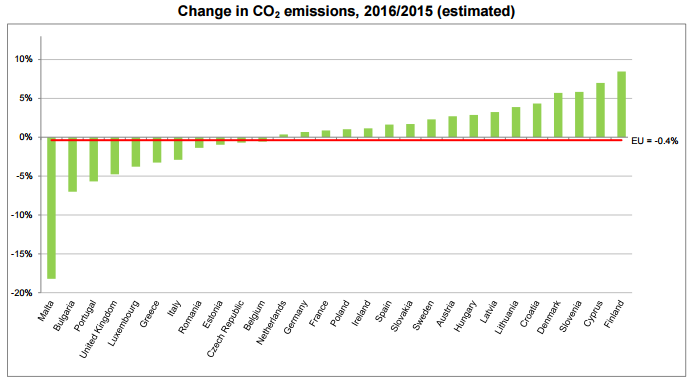Brussels – Eurostat estimates that in 2016 carbon dioxide (CO2) emissions from fossil fuel combustion decreased by 0.4% in the European Union (EU), compared with the previous year. CO2 emissions are a major contributor to global warming and account for around 80% of all EU greenhouse gas emissions. They are influenced by factors such as climate conditions, economic growth, size of the population, transport and industrial activities. Various EU energy efficiency initiatives aim to reduce emissions of CO2 and other greenhouse gases. It should also be noted that imports and exports of energy products have an impact on CO2 emissions in the country where fossil fuels are burned: for example if coal is imported this leads to an increase in emissions, while if electricity is imported, it has no direct effect on emissions in the importing country, as these would be reported in the exporting country where it is produced.
Largest falls in CO2 emissions in Malta and Bulgaria, highest increases in Finland and Cyprus According to Eurostat estimates, CO2 emissions rose in 2016 in a majority of EU Member States, with the highest increase being recorded in Finland (+8.5%), followed by Cyprus (+7.0%), Slovenia (+5.8%) and Denmark (+5.7%). Decreases were registered in eleven Member States, notably in Malta (-18.2%), Bulgaria (-7.0%), Portugal (-5.7%) and the United Kingdom (-4.8%).






![Gli impianti siderurgici di ArcelorMittal, l'ex Ilva di Taranto [foto: Gaetano Lo Porto/imagoeconomica]](https://www.eunews.it/wp-content/uploads/2025/05/Imagoeconomica_1376124-350x250.jpg)
![Esterno della casa circondariale di Bergamo [foto: Marco Cremonesi/imagoeconomica]](https://www.eunews.it/wp-content/uploads/2025/05/Imagoeconomica_1556965-350x250.jpg)




![Il presidente della Repubblica, Sergio Mattarella (sinistra), con il presidente del Consiglio Europeo, Antonio Costa [Bruxelles, 20 maggio 2025. Foto: Quirinale]](https://www.eunews.it/wp-content/uploads/2025/05/mattarella-costa-120x86.jpeg)

